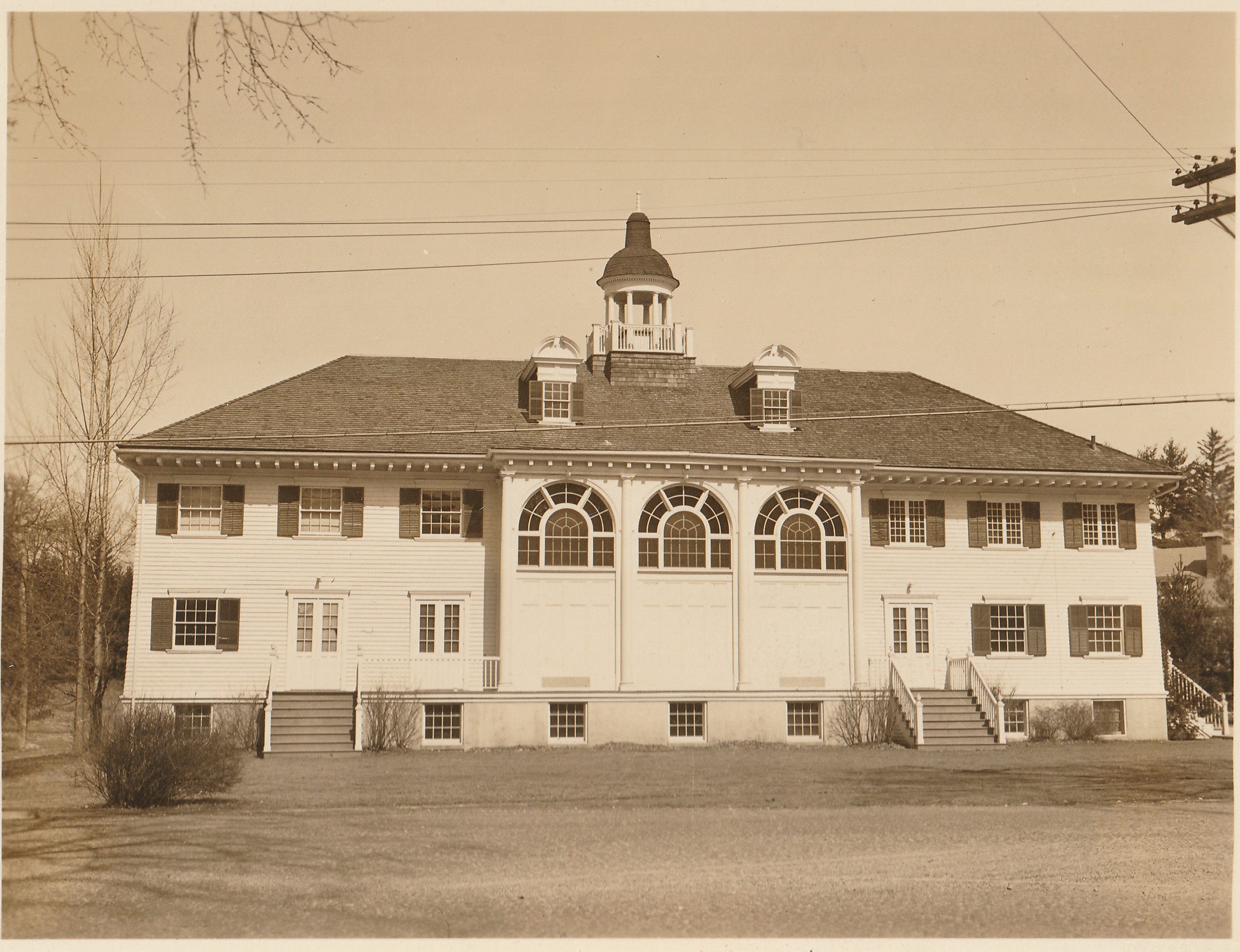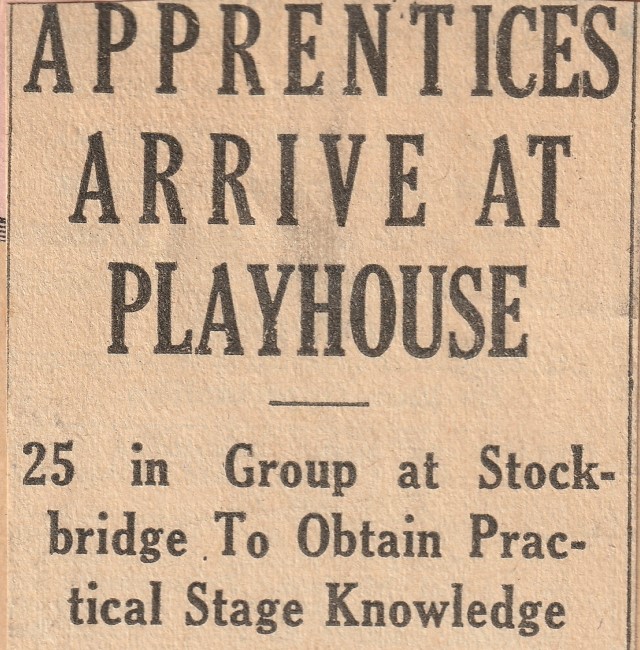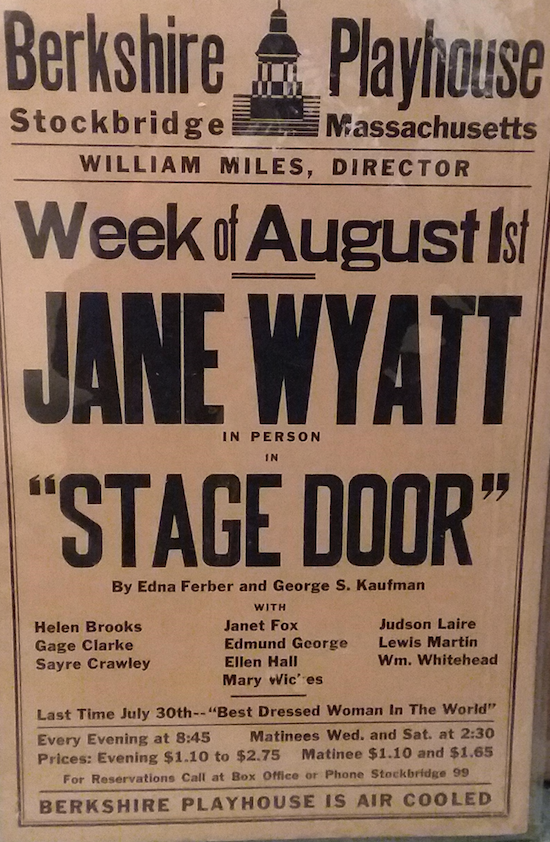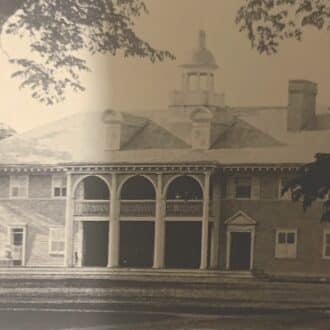
Berkshire Playhouse circa 1930s.
The Berkshire Playhouse Blossoms
As we head into the ninetieth year of production, it is important to remember the storied beginnings of Berkshire Theatre Festival. Eva Le Gallienne was integral to the creation of BTF as a champion and pioneer of regional theatre. Her company, the Civic Repertory Theatre, “laid the groundwork for [the] Off-Broadway and the regional theatre movement,” according to a December 1998 article from Playbill.
 Alexander Kirkland, part of the Civic Repertory Theatre, became the first artistic director of the Berkshire Playhouse and on June 4, 1928 the Playhouse opened its doors with Eva Le Gallienne in The Cradle Song (pictured to the left). Myriad productions followed, many including the brightest names of stage and screen, but the Fitzpatrick Main Stage began its days as The Stockbridge Casino, designed in 1887 by McKim, Mead, and White.
Alexander Kirkland, part of the Civic Repertory Theatre, became the first artistic director of the Berkshire Playhouse and on June 4, 1928 the Playhouse opened its doors with Eva Le Gallienne in The Cradle Song (pictured to the left). Myriad productions followed, many including the brightest names of stage and screen, but the Fitzpatrick Main Stage began its days as The Stockbridge Casino, designed in 1887 by McKim, Mead, and White.
The Stockbridge Casino building was completed in 1888 and remained an important cultural center in Stockbridge until the 1920s. After the building began to fall into disrepair, Mabel Choate (daughter of Joseph Choate, one of the founders of the Stockbridge Casino Company) announced her plans to buy the Casino, dismantle it, and replace it with the Mission House, which she planned to transform into a museum.
Unwilling to let an historic building fall, Daniel Chester French, Austen Fox Riggs, and Walter L. Clark purchased the Casino building for one dollar and moved it to the foot of Yale Hill Road in 1927. The following year they formed The Three Arts Society, and Alexander Kirkland and F. Cowles Strickland became co-directors of the Berkshire Playhouse.
According to various newspaper accounts, the parking lot of the Playhouse was filled with limousines for its grand opening night. Despite this glamorous beginning, Berkshire Playhouse has always been more committed to community than profits. The Playhouse operated as a non-profit theatre even during the twenties and thirties as “at the end of each season, any profits are turned over to the Fine Arts building fund of Stockbridge,” according to an August 1930 article from Heart of the Berkshires. Kirkland and Strickland not only worked to better their community, they also brought in young theatre artists to cultivate.
A Star is Born

From the first summer, Berkshire Playhouse employed students from Yale University to work as their production crew. According to Walter L. Clark’s memoir, Leaves from An Artist’s Memory, Professor Baker from Yale was “pleased to have his young men practice in the summer what he was training them to do in the winter” (260). The Acting Apprentice program, also called the “Junior Company,” was established in 1929, and by 1930 such performers as Jane Wyatt and Katharine Hepburn had joined. These programs still continue almost ninety years later.
The apprentices (around a dozen for the first few years, with one of the largest groups totaling 25) spent their days learning characterization, pantomime, voice, dancing, and fencing. As of 1931, apprentices performed student productions once every two weeks. These performances were open to the Playhouse company and invited guests. The performances were in addition to them attending all Playhouse performances. Pictured to the right: A headline from the Berkshire Eagle on June 24, 1933 announces the arrival of new Berkshire Playhouse apprentices.
Apprentices were sometimes offered small roles in summer subscription shows, which afforded them the opportunity to work alongside high-caliber professional actors. They were also expected to help create the scenery and costumes for each show as part of their “general application” training in theatre. Pictured below: a poster featuring Jane Wyatt in Stage Door in 1938, a former apprentice returned as a star.

Almost ninety years later, Berkshire Theatre Group offers internships in everything from carpentry and props to marketing and finance. The acting internship program is still alive, well, and currently led by David Adkins, who was an apprentice himself back in 1985.
Berkshire Theatre Festival reflects the history of the American theatre and represents a priceless cultural resource for the community. For almost ninety years, Berkshire Theatre Festival has been committed to being a center for creative work that enriches, invigorates and transforms artists and audiences.


